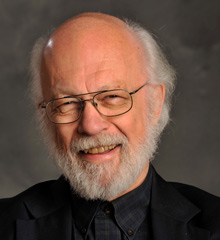When asked about their prayers, many people say that God has three answers available: Yes, No, and Wait (or some variation thereof). I invite you to consider an additional response: God has determined to answer prayers in a positive way, but God’s will to do so is being successfully resisted. This resistance may come from within ourselves (e.g., our arrogance), but it may also come from powerful factors at work in the context about which we are praying.
Some people speak with too much confidence regarding the effectiveness of prayer. I pray for a parking place, and lo! one appears around the next corner. Or, the efficacy of prayers is related to the depth of one’s faith. Really? Do you suppose that the apostleDerived from a Greek word meaning "one who is sent," an apostle is a person who embraces and advocates another person's idea or beliefs. At the beginning of his ministry Jesus called twelve apostles to follow and serve him. Paul became an apostle of Jesus... More PaulThe Apostle Paul, originally known as Saul of Tarsus, was the author of several New Testament letters and the founder of many Christian communities. More did not have enough faith, and that was why his prayer to remove the thorn in his flesh failed?
Among believers, a remarkably limited sense regarding the efficacy of prayer is common. Sometimes, prayer is nothing more than a meditation that centers us or quiets us down, like a good nap! Others will extend the point: Prayer has an effect on the relationship between the one praying and God; the relationship is, say, made more mature. But all too often, change is thought to occur only on the human side of the relationship. Yet, the Bible claims that God is also affected by prayers offered. Many biblical texts claim that prayers do have an effect upon God and do shape the future (e.g., Exod 32:7-14; 2 Kings 20:1-7; Luke 18:1-8). God will take the human expression of concern with utmost seriousness, not least because God values the relationship and honors it. Somehow, the power of God is made more available in a situation because we have prayed.
In such considerations, much depends on one’s image of God. For some believers, God cannot be affected by our words and God certainly cannot be persuaded by what we say. God will do what God will do — regardless of what people have to say. At the same time, prayer is sometimes so conceived that God always gets God’s way. God’s will always gets done! Or, does it? Consider several factors.
Our relationship with God is not mechanical in nature, as if our prayers triggered in God some already programmed responses. One must insist on the living, dynamic character of the relationship. Responses within any relationship — with human beings or with God — are never programmed or predictable, even between those who know each other very well. And this is even more the case in that God is God and we are not.
Another factor to be taken into account is the pervasiveness of sin and evil that can get in the way of God’s responses to our prayers. For example, we pray for healing, and healing is not forthcoming. When that happens, we may end up blaming God for not answering our prayers. We so often make God the “heavy” in these matters. In fact, however, it may have been the medicine we were (not) taking or a member of the medical community who blew it.
Sometimes when we pray, we may think: all that is at work in this situation is our prayer and God. But a multitude of other factors are present in any given moment of prayer. Some of those factors may be so resistant to God’s will, that God’s will does not get done. The accumulated effects of sinfulness may be so powerful that even God’s options are limited (in view of promises made, to which God will be faithful). And God’s heart is the first heart to break, and God’s tears the first to flow.
An analogy may be suggested: human sinfulness has occasioned numerous instances of the misuse of the environment. Some of that misuse (e.g., pesticides) has caused cancer in human beings and devastated animal populations. Human beings may be forgiven by God for their sin, but the effects of their sinfulness will continue to wreak havoc beyond the act of forgiveness. We confess that in response to prayer God is at work in these effects, struggling to bring about positive results in and through human (and other) agents. It is not a question as to whether God wills good in the situation. The issue is God’s relational commitments that may entail self-limiting ways of responding to evil and its effects in the world. Anti-God factors may be powerfully present and shape the future in negative ways, even for God.
To conclude, prayer is a God-given way for God’s people to make a situation more open for God, to give God more room to work, knowing that God always has our best interests at heart. Prayers do shape the future in ways different from what would have been the case had no prayers been uttered. At the same time, the people of God are not in the hands of an iron fate or a predetermined order of things. God’s will may be successfully resisted or God may be open to taking new directions in view of new times and places. Yet, never changing will be God’s steadfast loveThe steadfast love (hesed) of God is the assurance of God's loving kindness, faithfulness, and mercy. This assurance rings throughout the Old Testament, and is affirmed more than 120 times in the Psalms. In some hymns of praise the response of the people was likely... More for all, God’s saving will for everyone, and God’s faithfulness to promises made.




